News and Announcements
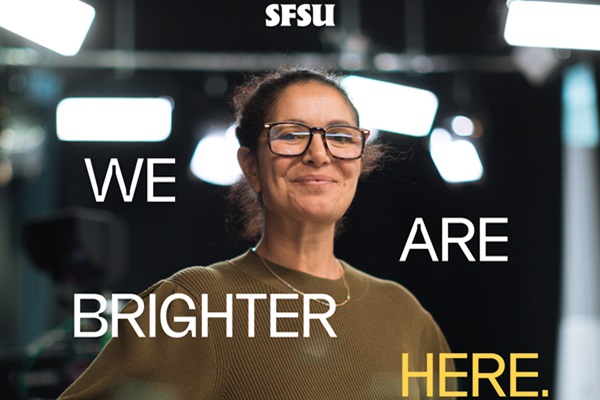
Please join the Office of Strategic Marketing and Communications for “The SFSU Brand Story Town Hall,” a presentation and workshop on Wednesday, April 30, 9:30 a.m. – 3 p.m., in Library 121.
Strategic Marketing and Communications will introduce the University’s new brand messaging and visual identity. Presentations will explore the brand in depth, showcase how it will come to life and discuss the role of the University community in its success. This is an opportunity to get familiar with and aligned with “Brighter Here.”
The new brand messaging and visual identity are designed to bring greater clarity, consistency and distinction and align a collective voice to make communications efforts more powerful, engaging and effective. This is how the SFSU community tells its story collectively to prospective students and their families, alumni, campus partners and the broader communities.
Please visit the Strategic Marketing and Communications website for details and to RSVP. Seats are limited.
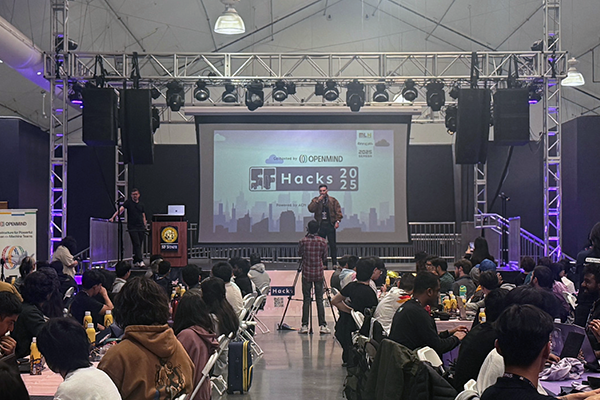
After successfully reinstating SFSU’s in-person hackathon last year, SF Hacks kept the momentum rolling by jumping into planning their 2025 event and making it bigger and better.
On April 4 – 6, 300 hackers convened at SFSU’s Annex 1 for the annual SF Hacks hackathon. Participants came from all over the country, with over 80% coming from all over California and 30% returning from SF Hacks 2024. The attendee number jumps to 430 when considering volunteers, judges, mentors and more. The event almost hit the venue limit on the first day.
At its core, SF Hacks is a 48-hour hardware and software building competition, but that description doesn’t fairly encapsulate the event. It is really a community affair with mini events, panels, workshops, professional and social networking, fun activities like Bob Ross painting and tennis, complimentary food … and it’s a totally free event to boot.
“Of course, we have the innovation aspect that is with all hackathons. But something we feel is important and strongly about here at SFSU is our social activism,” said SF Hacks President Marco Garcia, a Computer Science sophomore, of this year’s “tech for good” theme.
“With so many different ways to harness technology, it’s so important we have a guiding principle and that is to build for good,” said SF Hacks Director Ria Thakker during the opening ceremony, encouraging hackers to think more deeply about what it means to build for good. “What are your preferred use cases, whose perspectives you’re considering and how to utilize your knowledge to give back to your community."
One project that placed in several categories was a robot called Remi that helps people with memory loss. When Remi sees a familiar face, it recalls and shares details about that person to the user. An SFSU team won the Best AI Emerging Technology prize with their project Secure Sense. This project helps prevent information leaks by detecting and blocking or masking sensitive data when people use generative AI tools like ChatGPT or Gemini.
Although it can be daunting, it’s rewarding to push yourself on your own terms to see what you can do, explained SF Hacks Sponsorship Chair Keith Curry, a senior double majoring in Computer Science and Biology. “We take all these courses and learn all these skills. But a lot of times, the curriculum doesn’t test the extent of our ability. It just tests our ability to adhere to a curriculum.”
However, students don’t need to be experienced coders, or even computer scientists, to participate. There are tools and mentors available to help beginners learn technical skills. This year, SF Hacks also highlighted the cross-disciplinary collaboration needed to build projects, said SF Hacks Vice President Ashley Ching, a Computer Science senior.
“We tried to get many people outside of technical roles, like product managers, researchers, UX designers and other roles more geared towards user experience or full vision,” she explained. “We aimed to get those people involved so people can learn from them.”
More than 17 industry and academic sponsors supported this year’s event. SF Hacks 2025 was the first SF Hacks to secure a title sponsor and co-host OpenMind through the single largest contribution in SF Hacks history, the team explains. Some sponsors supported specific tracks: SFSU’s Lam Family College of Business sponsored the “best start-up pitch” track, rewarding the top team a $1,000 seed fund. In total, 32 judges awarded over $7,000 in prizes (monitors, air fryers, cash and more) across different challenge tracks and overall competition.
All of this — event logistics, finances, marketing, sponsorship and all other details — was organized by students. The core SF Hacks leadership includes over 40 students who collaborate with another 11 SFSU student organizations.
“I’ve been here for two years. I was roped into it by my friend. Now I’m too deep into it and can’t quit,” laughed Thakker, a third-year Computer Science major.
“When you plan it, it’s very satisfying to see everything that you worked for and seeing the impact,” added SF Hacks Treasurer Kurt Balais, a Computer Science senior.
Learn more about SF Hacks events, this year's projects and the Department of Computer Science.
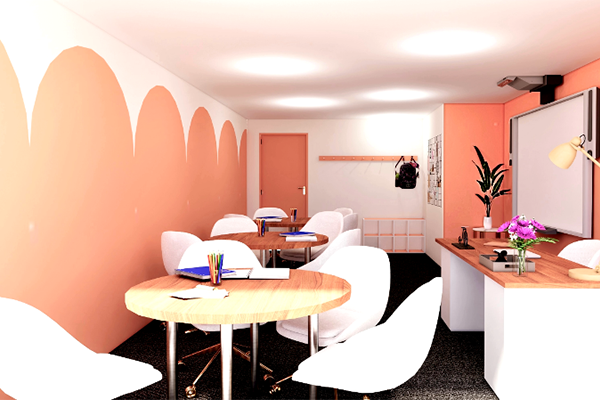
The spring semester brought about the opportunity for graduating senior Interior Design and Architecture students to utilize their talents for a cause. Oasis for Girls is a nonprofit organization that provides “healing-centered, trauma-informed programs in life skills and leadership, wellness, creativity and career readiness for high school girls from under-resourced communities across San Francisco.”
Oasis for Girls has moved into a new location in San Francisco and sought design ideas that would be inspiring, functional, creative and meaningful for the girls and the Oasis team. SFSU students were provided with an existing floorplan of each space in the new location.
During the first “Advanced Interior Design and Architecture Studio” class meeting this semester, they listened intently as Executive Director LaVonda Baldwin, Advisory Board Chair Susan Calderon and Advisory Board Member Cristina Amorim, shared their vision and needs for the space. Students developed design concepts that addressed the requests for this project and provided design solutions shining a light on the needs of youth who participate in Oasis for Girls programs. The Oasis team reviewed all the student work and provided their final wish list.
The students embraced the opportunity to give back and to support Oasis for Girls’ vision for the new location, says Professor Gus Vouchilas, chair of the Family, Interiors, Nutrition and Apparel Department.
Image courtesy of the Family, Interiors, Nutrition and Apparel Department
The General Education (GE) program has been revised throughout the CSU system. The number of GE units will be reduced from 48 to 43, effective fall 2025.
Faculty teaching a GE or SF State Studies course this fall will need to update their course syllabi and course materials to reflect the revised course learning outcomes. All courses that meet GE, SF State Studies and/or American Institutions requirements must include the course learning outcomes for these areas in the syllabi and identify the assignments used to assess student learning for each outcome.
For more information, please visit the General Education Fall 2025 page.
The spring 2025 Academic Senate voting period is underway. The SF State Academic Senate urges all faculty and staff to vote in its elections. Participation in this shared governance process ensures the success of collective deliberation across the campus.
Online ballots:
Voting closes at 5 p.m. Friday, April 25. For questions, please email the Senate office at senate@sfsu.edu.
The SF State Academic Senate met on Tuesday, April 8, via Zoom.
The Senate:
- Passed the following items:
- Resolution to Endorse AS-3609-23, Encouraging Campus Faculty Legislative Liaisons
- Revision to Department Chairs and Equivalent Unit Directors, #S24-145
- Revision to Policy on Emerita/Emeritus Status, #F14-147
- Heard in first reading the following:
- Revision to Policy on Restructuring Academic Units, #S21-290
- Bachelor of Arts in Chinese, concentration in Flagship Chinese Language: suspension
- Master of Arts in Anthropology: suspension
- Master of Arts in Women and Gender Studies: suspension
- Tabled the following items until next plenary on Tuesday, April 22:
- Revision to #S20-151 All University Committee on International Programs
- Revision to #S19-014 University on Written English Proficiency
- The meeting was adjourned before the following items were heard in first reading and will be heard in first reading at the next plenary on April 22:
- Revision to Academic Freedom Policy, #F13-267
- Resolution Calling for a Report on the Instruction of Reading and Writing
- Resolution in Support of Student Parent Success at San Francisco State University
- Heard presentations on:
- “Website Redesign” by Christopher Clark, director of integrated college communications
- “Academic Senate of the California State University (ASCSU) Updates” by Rob Collins and Dipendra Sinha, ASCSU senators
Candidates have been selected for interviews for the position of vice provost of Academic Resources. The campus community is invited to attend each candidate’s presentation, followed by a Q&A session and a light reception in Library 244.
Confirmed candidate presentations:
- Tuesday, April 15: Michael Scott
- Monday, April 21: Carlos Cortez
Additional candidates and full details, including presentation times and candidate information, will be posted on the webpage for the position search shortly.
If you have any questions, please contact Mona Sagapolutele at monas@sfsu.edu.
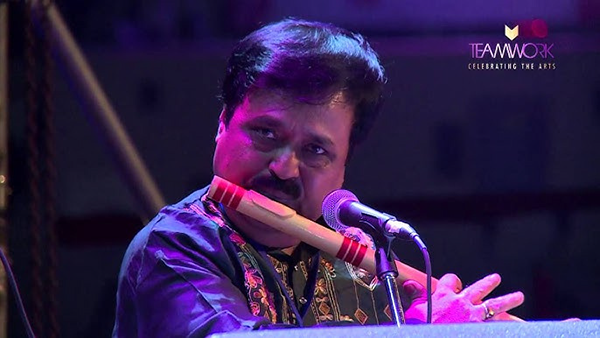
Assistant Professor of Computer Science Sanika Doolani invites the campus community to a special Indian classical flute recital by her father, Pandit Sunilkant Gupta, a Grammy Award-winning artist who has performed across the globe. It will be held Tuesday, April 15, 1 – 2 p.m., in Knuth Hall, Creative Arts building.
Event sponsors are the Computer Science Department and the School of Music.
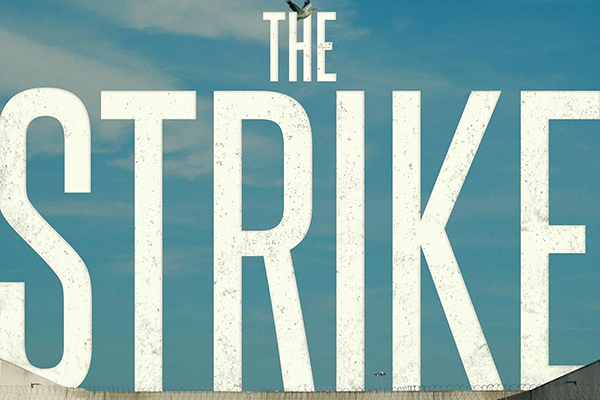
The campus community is invited to the Alternatives to Incarceration Fair and subsequent film screening of the documentary “The Strike” scheduled for Tuesday, April 15, in Jack Adams Hall, Cesar Chavez Student Center. Faculty are encouraged to offer extra credit and bring classes to watch this award-winning documentary.
The fair takes place 3:30 – 5 p.m. Bay Area anti-prison organizations tabling at the fair include FLY, CURYJ, Youth Law Center, Silicon Valley De-Bug and Success Stories. Members of the campus community can get involved locally and take action against injustices in the criminal justice system.
“The Strike” will screen 5 – 6:30 p.m. It documents the rise of the 2011 – 2013 prisoner hunger strikes and the torture endured by those held captive within California’s security housing units. A panel discussion will follow the film 6:30 – 7:30 p.m., with former prisoners who spent decades in solitary confinement and prison hunger strike activists will follow the film. Panelists are Richard Johnson, Jack Morris, Dolores Canales and filmmaker Lucas Guilkey.
Event presenters are Project Rebound, the Criminal Justice Studies Department and the Race and Resistance Studies Department.
For more information, please email Assistant Professor of Criminal Justice Studies Angelica Camacho at camachoa@sfsu.edu.
The “AI Literacy Essentials: Introduction to Generative AI” course introduces generative artificial intelligence (AI) to those with little or no prior experience engaging with this emerging technology. It will be held Wednesday, April 16, 11 a.m. – 12:30 p.m., via Zoom.
Participants obtain a foundational understanding of generative AI, its associated opportunities and implications, and basic strategies for composing and iterating prompts. Participants will engage in hands-on interaction with the Microsoft Copilot chatbot to begin generating practical outputs for personal and professional use cases.
This course is required to receive a digital badge for the AI Literacy Education Program.
The Department of Criminal Justice Studies hosts “Bringing People Home,” a panel discussion on California resentencing statutes, on Wednesday, April 16, 12:30 – 2 p.m., in HSS 204.
California’s “recall and resentencing” law has enabled the California Department of Corrections and Rehabilitation and district attorneys to refer people back to court to be resentenced and released. This event will bring together experts in the field to discuss resentencing’s background, outcomes, needs and prospective futures.
Please register via Qualtrics for the “Bringing People Home” panel discussion.
The Division of Graduate Studies & Career Development invites the campus community to its Graduate Research and Creative Works Showcase on Wednesday, April 16, 2 – 4 p.m., in the MAC Gym, Mashouf Wellness Center.
The Graduate Research and Creative Works Showcase is an annual exhibition of work of SF State graduate students. Students present the purpose, design, methods and results of their research and creative projects in a conference-style setting.
The All-University Committee on International Programs invites all faculty, staff and administrators to an International Coffee Hour on Thursday, April 17, noon – 1 p.m., in the Library Teaching and Learning Commons (Library 286). Please stop by for light refreshments, provided by the Division of International Programs.
A student member of the committee will share a presentation titled “My Journey as an International Student.” This the committee’s last coffee hour of the semester. The event aims to connect international and internationally minded faculty, administrators and staff and provide a forum to discuss international programs and global issues.
Please RVSP via Qualtrics to the International Coffee Hour. RSVP strongly encouraged.
The “AI Literacy Essentials: Prompting for Practical Applications” course offers a focused exploration of prompting and iteration strategies for generative AI chatbots like Microsoft Copilot. It will be held Thursday, April 17, 2 – 3:30 p.m., via Zoom.
Through collaborative, hands-on activities and interactive exercises, participants will learn to write clear and effective prompts, apply refinement techniques such as prompt chaining and assess AI-generated outputs for accuracy and relevance to achieve more reliable and useful results in a variety of academic and non-academic contexts.
This course is required to receive a digital badge for the AI Literacy Education Program.
The Lam-Larsen Initiative for Emerging Technologies, in partnership with SAP, hosts the “AI and the Future of Work” conference on Friday, April 18, 9 a.m. – 5 p.m., at SAP Labs, 135 Townsend St., in San Francisco. It explores how artificial intelligence (AI) is reshaping the future of work, including enterprise innovation, real-world applications and workforce transformation.
The conference includes a keynote, panel discussions, a fireside chat and technology showcases. It is open to SFSU students and faculty, creating an opportunity to network with SAP professionals, industry leaders and fellow innovators.
Please register via the Lam Family College of Business website.
The University Budget Committee (UBC) invites campus the campus community to its next meeting on Thursday, April 24, 10 a.m. – noon, via Zoom.
Please RSVP via email to ubc@sfsu.edu.
Committee members represent staff, faculty, students and administrators. They offer virtual office hours on Friday, April 25, for questions and feedback about budget-related matters.
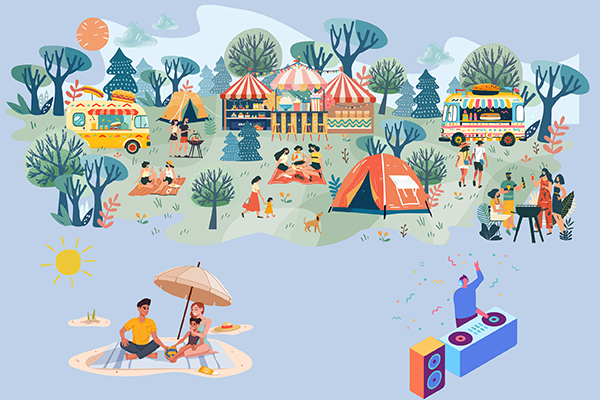
The “Ready, Set, Safety!” presentations are a series of lunch and learn meetings led by the Risk and Safety Services Division. These talks are designed to inform the community of risk mitigation programs in place at SF State. The next presentation will be held Thursday, April 24, 11:30 a.m. – 12:30 p.m., via Zoom. It will cover summer safety. Presenters will provide safety tips for social gatherings events taking place over the summer or in general.
The campus community is encouraged to attend and participate in these discussions as they offer an open forum for anyone interested in learning more about a variety of topics.
Image courtesy of the Risk and Safety Services Division
The Student Fee Advisory Committee will hold its next meeting on Thursday, April 24, at 3 p.m. via Zoom. Members of the campus community who wish to present items or requests to the committee should email their request and supporting documents to the Office of the Vice President for Student Affairs & Enrollment Management at vpsaem@sfsu.edu by Friday, April 18. The deadline ensures placement on the agenda and provides the committee adequate time to review requests.
For questions, please email the Office of the Vice President for Student Affairs & Enrollment Management.
SF State Spotlight
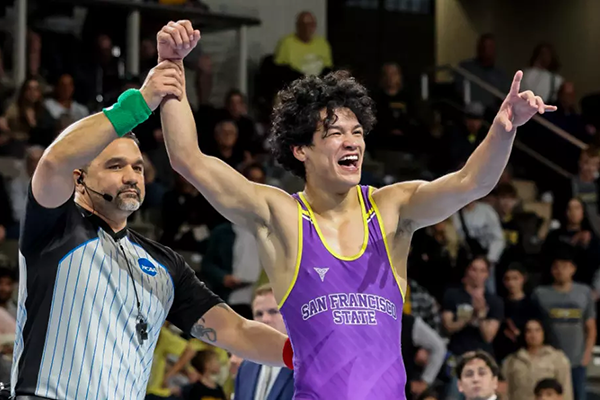
On April 5, the news on KTVU-TV ran a feature segment on the Gators’ Johnny Lopez, the National Collegiate Athletic Association (NCAA) Division II national champion in men’s wrestling.
“I’d been picturing this day for a long time, and it finally came to fruition,” Lopez said. “I was excited, but I wasn’t surprised.”
Jason Welch, SF State men’s wrestling head coach, says that Lopez’s championship will help with recruiting and fundraising.
“We love that he’s a sophomore, so we have two more years with him, and we also love that when we go to recruits this spring or to our alumni for fundraising, etc.,” Welch said. “We're not saying, ‘Hey, we’ll be good eventually. Hey, if you invest in us, we’ll give back.’ We’re saying, ‘Hey, we’re winning now. Come to our school.’”
Photo courtesy of the NCAA
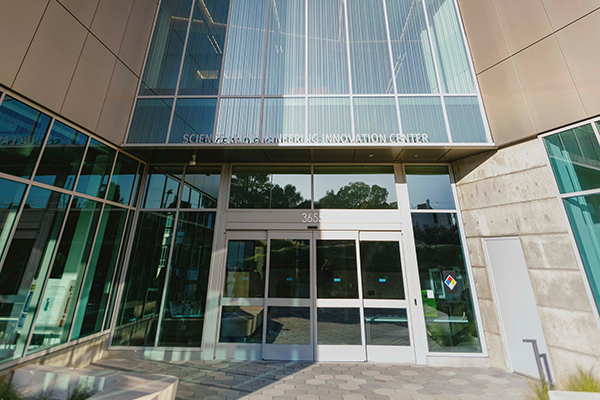
The San Francisco Business Times recently honored SFSU’s new Science and Engineering Innovation Center at the Real Estate Deal of the Year Awards. The building is on a list that includes OpenAI, Rippling, Airbnb leases, the Transamerica Pyramid’s relaunch and more.
An independent editorial review chose the honorees based on their merit, achievements and contributions to their organization and local community. Representatives from SFSU and SmithGroup attended the ceremony to accept the award.
Photo by Juan Montes
Computer Science Professor Dragutin Petkovic and Economics Professor Anoshua Chaudhuri presented a paper, “Issues and concerns about GenAI and how we can smartly use it in education,” at the Association for the Advancement of Artificial Intelligence 2025 symposium in the session on education. The presentation and paper won the second prize for Best Paper.
Marc Stein, the Jamie and Phyllis Pasker Professor of History, contributes a video to “Banned Books: Why Young People Need Them,” a project of the University of Michigan’s Center for Social Solutions for Right to Read Day (April 7) during National Library Week.
In his video, Stein recommends “Flamer,” a graphic novel by Mike Curato.
“I think this book has the ability make change, make positive change, to save lives,” Stein said. And I mean most sincerely, especially for people struggling with their gender and sexual and racial identities. I certainly give it five stars.”
Associate Professor of American Indian Studies Robert Keith Collins chaired a panel and a roundtable at the 46th American Indian Workshop at the Universidad Auto’noma de Madrid on March 27 – 28.
The panel on “Materiality and Language” explored this relationship and the natures and sources of literacy and Native language knowledge among the Mi’kmaq, Coast Salish and evident in Kota string figures.
The roundtable discussion, “Unsettling Indigenous Representation in European and U.S. Museums: Toward International Language of Collaboration with Native American Communities,” centered on emerging paradigms and new policy language and models that can facilitate further transformation and Indigenization of museums in both Europe and the U.S.
Professor Yutian Wong from the School of Theatre and Dance published “Sincerely Funny or Funny Sincerity: ‘Avatar: The Last Airbender’ and Cosplay Choreographies” in “Funny Moves: Dance Humor Politics edited by Marta Savigliano and Hannah Schwadron” (Oxford University Press, 2025).
Wong’s essay examines how fans of the cult classic “Avatar: The Last Airbender” engage with the anti-imperialist narrative at the heart of the beloved animated children’s television show. Written during the COVID-19 pandemic, the essay analyzes how the show inspired belly dance, hip-hop and drag performances to revisit Lionel Trilling’s “Sincerity and Authenticity” and desires for sincerity as an aesthetic in times of crisis.
KSFS, the SF State student-run radio station, recently began a new daily report on traffic and transit near campus. It airs at 4:45 p.m. on weekdays. The San Francisco Metropolitan Transportation Agency published a blog post on April 7 about the report.
“I’m a commuter student and know how valuable traffic reports are,” said Casey Crews, a Broadcast and Electronic Communication Arts major and the KSFS production manager. “... I love it because it fits into the much bigger picture of broadcasting supporting the community.”
Faculty adviser Elaine Leung (B.A., ’96) is a traffic reporter for Total Traffic & Weather/iHeart Media.
“I came up with idea for ‘KSFS Transit-Traffic Report’ because we’re a commuter school, and there’s a need for it,” Leung said.